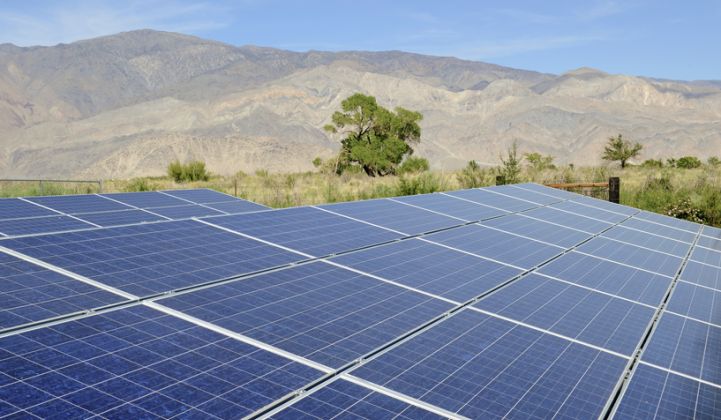Prices for solar in Mexico’s latest auction may not have set a new world record, but have raised eyebrows among analysts nevertheless.
Average solar prices were in the $20 per megawatt-hour range, said GTM Research Americas solar analyst Manan Parikh. “I was surprised the average cost of solar broke the thirties because I thought the prices would stabilize more, given that the commissioning date is still only two and a half years out,” he said.
Global solar developer Neoen secured the lowest solar bid, at $19.18 per megawatt-hour -- which represents the lowest solar price seen in Latin America to date.
GTM originally reported that Mitsui-Trina secured the lowest bid at $19.74 per megawatt-hour. However, a review of the calculations reveals that Neoen's bid broke the Latin American record.
"The Mexican tender is highly complex (probably the most complex in the world), and to get to the price in USD/MWh, you cannot simply divide the package price by the energy quantity offered. You first need to recalculate notional prices using official factors published by CENACE in the tender guidelines," said Lionel Bony, regional director for Neoen's Mexico, Central America and Caribbean operations.
After using the tender guidelines and converting to USD, Neoen's bid comes in $19.18 per megawatt-hour, lower than the $20.47 earlier reported.
The clean energy certificates may have been a major factor in helping deliver price cuts, which have seen the cost of energy more than halving over three auctions, from $44.90 per megawatt-hour in the first round to $31.70 in the second and $20.53 in the one completed this November.
“It’s important to note that the prices have the CEL tied to them, so that will help to increase the return rate on some of the projects,” Parikh said.
Apart from price, the Mexican auction was notable for several other reasons, he said.
The number of winners was relatively small, with X-Elio, Neoen, Canadian Solar, Engie Solar and the Mitsui-Trina joint venture carrying off all of the 992 megawatts of energy capacity awarded in the auction, across nine out of 14 lots.
Of these, all but Neoen and Mitsui-Trina had won contracts in previous auction rounds. The old-timers walked away with around three-fifths of the capacity on offer, with Engie bagging 449 megawatts, Canadian Solar securing 294 and Spanish developer X-Elio taking 200.
“Given the small number of developers, it just looks like several developers are building very large projects as opposed to what we saw in round two, where there was a plethora of developers with smaller chunks of projects scattered around the country,” Parikh observed.
Another highlight of the contest was that it was the first energy auction in Mexico to feature more than one offtaker. In previous rounds, all the capacity was destined for Mexico’s state-owned Federal Electricity Commission (Comisión Federal de Electricidad or CFE).
This year, the government also opened the field to three private sector energy retailers: CFE Suministrador de Servicios Básicos, Iberdrola Clientes and Menkent, a subsidiary of the Mexican cement giant Cemex.
“This is the first auction in which the true wholesale power market is opened up in Mexico,” said Benjamin Attia, research analyst for global solar markets at GTM Research.
A strong showing from Engie and Enel, which scooped 593 megawatts of wind capacity, demonstrated the value of vertical integration in winning central tendering schemes such as the one in Mexico, he said.
Vertically integrated developers would be better equipped to provide long project development track records for prequalification, as well as having better access to cheap finance and a greater ability to absorb the risk inherent in forward module price assumptions.
They would also likely have global asset management teams that could work toward extending system lifetimes and keeping operational expenses sufficiently low to give the developers a significant head start in competitive bidding, said Attia. Other developers looking to break into Mexico’s fast-growing solar market have their work cut out for them.
The question now is how much lower these developers can go. Analysis from advisory firms such as Lazard seems to show that PV cost reductions are bottoming out. But auction bidders in Mexico, Chile, Saudi Arabia and elsewhere don’t seem to have got the memo.
Two months ago, Masdar submitted a jaw-dropping bid of $17.86 per megawatt-hour for solar in Saudi Arabia.
Shortly after, in Chile, Enel promised to deliver solar power at $21.48 per megawatt-hour, briefly setting a new record for Latin America until Mexico’s auction results were announced. “This is yet another signal of the ongoing paradigm shift happening in solar prices,” Attia said.
“It was not long ago that record-breaking prices broke the 5- and 4-cent barriers, and everybody said: ‘We've hit the bottom’,” he noted.
“Now, between bids for 1.97 cents per kilowatt-hour in Mexico and 1.786 cents per kilowatt-hour in Saudi Arabia, the industry needs to start thinking about what the price floor for unsubsidized solar might really look like with current technologies,” said Attia.
The average price for Mexico's third action was $20.57 per megawatt-hour, with solar bidders winning contracts for 55 percent of the energy sold and wind power winning the remaining 45 percent. "Renewable energy is an option of electricity at low cost thanks to the extraordinary advances in technology," said Secretary of Energy Pedro Joaquin Coldwell, in a press release.
Joaquín Coldwell added that the fourth Long Term Electric Auction will announced during the first half of 2018.
***
Join GTM February 13-14 in Mexico City for an in-depth look at the country's rapidly expanding solar market. Solar Summit Mexico will leverage GTM Research’s expertise in Mexico to ensure your company is uniquely positioned to capture specific opportunities while appropriately managing regulatory, political and market risks. Find out more here.




